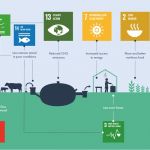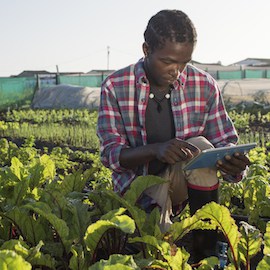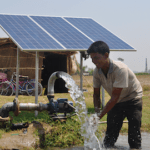A New Test for Old Technology: How COVID-19 is Sparking Innovation in PayGo Financing for Biodigesters
Biodigesters have long offered a way to transform animal manure into high-quality fertilizer and biogas. The cost and complexity of this technology, however, has placed it largely out of reach for smallholder farmers. A partnership in Cambodia between ATEC* Biodigesters International (ATEC*) and Feed the Future Partnering for Innovation, a U.S. Agency for International Development (USAID)-funded program, is working to change this.
The Impact of PayGo Financing on Biodigester Access
Typical biodigesters are expensive to install and difficult to maintain. By applying an innovative approach to a familiar technology, ATEC* developed and commercialized a “plug-and-play” biodigester system tailored to the unique needs of smallholders. The small-scale system, which includes a biodigester unit, a fertilizer storage hut, a gas-powered rice cooker and stove, and a desulfurizer, is designed for easy installation in any type of environment. Each unit can produce 1,500 liters of biogas each day, replacing the need for wood-burning cooking stoves, reducing kitchen air pollution and preventing deforestation. Farmers are able to utilize the 20 tons of organic fertilizer produced yearly by each biodigester on their lands, which can increase their crop yields by up to 32% and their incomes by an average of US $521 per year.
A smaller and more simplified design is only one critical part of the equation, however; the other is delivering the technology in a way smallholders can afford. Drawing inspiration from the off-grid solar energy sector, ATEC* integrated a patented pay-as-you-go (PayGo) approach. This enables qualified farmers to borrow the cost of the biodigester from the company and then make manageable repayments of approximately US $30 per month using mobile money. In a country like Cambodia, where the upfront costs of a biodigester can easily account for a quarter of annual household income, the launch of PayGo has helped ATEC* sell more than 500 biodigesters under the partnership. (For an in-depth look at ATEC*’s use of PayGo, please see the NextBillion article here).
Adapting the PayGo Model to the Challenges of COVID-19
As in other places around the world, the spread of COVID-19 in Cambodia has swiftly reshaped life for the country’s smallholder farmers. Due to travel and other supply chain restrictions, farmers are not easily able to sell their products in traditional markets. And other industries’ struggles are also impacting the financial outlook for smallholders. For example, Cambodia’s garment industry employs hundreds of thousands of textile workers who send money home to their families on farms, constituting a major source of their household income. The industry has been devastated by the pandemic, as factories close due to a lack of orders from international clothing brands. As a result of these combined factors, ATEC* has observed that its current clients have faced difficulty meeting their monthly payments. And it has anticipated a slowdown in its direct-to-consumer sales approach as government restrictions continue to unfold, and as households limit new spending and save extra income for necessities.
These challenges have forced smallholder farmers – and the businesses that serve them – to adjust in the face of a rapidly changing economic landscape. For smallholders, repayment conditions and incentives can significantly influence their decisions on how and when they use their limited resources. For ATEC*, this has meant building on its core business objective – helping smallholders overcome payment concerns through PayGo to access a critical technology – in even more responsive ways.
For instance, ATEC* has introduced flexible payment terms to help current customers continue to pay off their biodigesters, and to help new customers obtain a system for the first time. The company has restructured its PayGo loans so current customers have the option, if needed, to temporarily pay a smaller amount each month. And to help overcome the possible financial concerns of new customers, ATEC* has introduced a promotion enabling farmers to install a biodigester without any payment requirements for the first three months. Thus far, indications show that customers are benefiting from these flexible financing options, as repayment rates remain close to their pre-COVID-19 levels. By making payment terms more accommodating, offering financial incentives to new customers, and highlighting the respiratory health benefits of the technology, the company has been able to weather the challenging economic situation – despite staff travel restrictions and a significant decline in sales.
ATEC*’s experience over the last several weeks has demonstrated the unique adaptability of the PayGo model, and its effectiveness in delivering a critical technology despite unprecedented challenges. At the same time, it has also highlighted the heightened risk faced by companies if PayGo customers in precarious financial situations default on their payments. While this has been manageable for ATEC* so far, it underscores the need to consider the appropriate level of risk assumed by businesses, and the importance of careful consideration when selecting potential customers for flexible payment conditions.
As with the design of the small-scale biodigester itself, it’s essential to optimize the PayGo system that delivers this technology to the farmers who can benefit from it. With ongoing innovation in the payment model, biodigesters will continue to meet the needs of smallholder farmers and dramatically improve their livelihoods, even during these challenging times.
Laura Harwig is Director of Feed the Future Partnering for Innovation.
Photo courtesy of Manuth Buth / UNDP Cambodia.
- Categories
- Agriculture, Coronavirus, Technology



